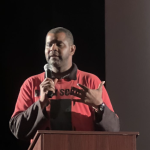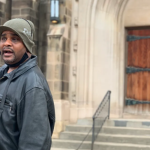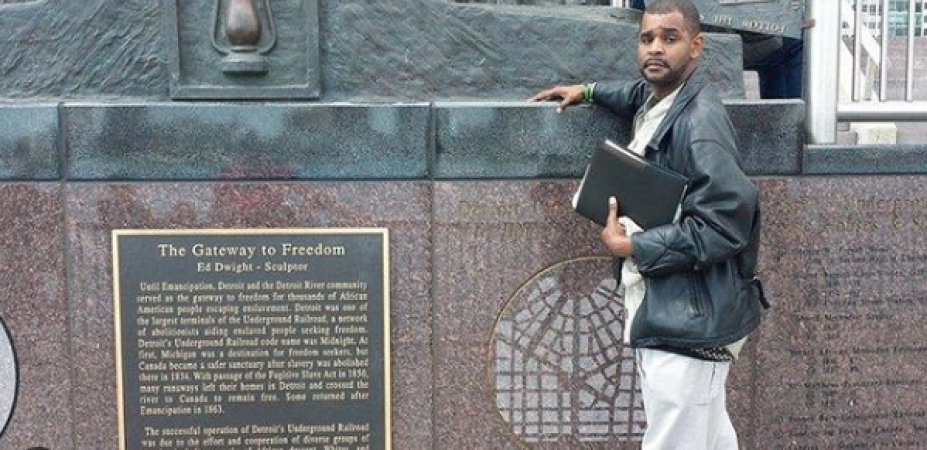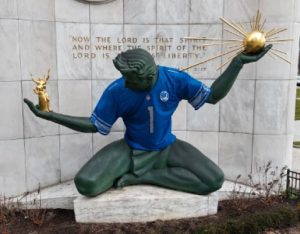Jamon Jordan, or Baba Jamon to his students, was appointed by Mayor Duggan as Detroit City Historian in October of 2021. As an elementary and middle school teacher, Jordan has strived to educate his students about history in a way that is inclusive and engaging. In 2013, Jordan founded the Black Scroll Network, which gives walking history tours to people looking to learn more about the history of Detroit. He also teaches a course in the University of Michigan’s semester in Detroit program, called “From the Underground to Motown: A Course on Detroit’s History.”
Detroitisit caught up with him now that he’s been Detroit’s Historian for a little over a year to get his perspective on the role and what it means to and for the city.
Q: What is your background and how did you become appointed as Detroit’s first official city Historian?
A: I was born and raised in Detroit, went to college, came back, and taught for 20 years in Detroit public and charter schools. One of the things I faced as a classroom teacher was that African American history was missing or limited in the curriculum.
So, I worked to assemble that information on my own to be able to provide it to the students.
Then I began to understand that students didn’t understand the history of Detroit. They were learning about the Black Panther Party in Oakland, California, and the Underground Railroad on the East Coast, and all these things in other cities, but not their hometown. I think that first and foremost, students should be grounded in the history of the place where they are from. So I began to include Detroit’s history, and how all these historical events around the country impacted and applied to Detroit. I began to take the kids on field trips.

JAMON JORDAN
The parents would come as chaperones and they started commenting that they didn’t know all of these things, and they became interested. Eventually, the parent’s friends started showing up to come along on the field trips! Clearly, I couldn’t take friends of the kid’s parents on field trips, so in 2013I started my own company Black Scroll Network History & Tours, and began leading my own tours on the weekends and during the summers.
Along the way I had several University of Michigan groups take tours and eventually was hired to teach a Detroit History course at U of M.
So, I was doing all this work in and around the city running tours and going to events and I became a bit more well-known. Eventually, Mayor Mike Duggan became aware of my work and I was appointed Detroit’s first official city Historian.
Q: What does a “day in the life” look like in this role?
A: Well, I do a lot of interviews with organizations and media who are working on things that involve understanding parts of Detroit’s history. I am involved with a lot of projects with the city as well. An example of something I’m working on now is the Dr. Ossian Sweet House. The city is developing an interpretive outdoor museum and plaza and I am part of the group that will help this come to fruition.
I am also the point person for historical markers around the city, some are missing, some never had markers, the language on the marker has to be correct, etc.
I recently created a history report for the Detroit Reparations Task Force to help them with their work. Juneteenth is coming up and I will present at several events. 2023 marks the 60th anniversary of the Detroit Walk to Freedom and I am part of a Summit that will take place. We are in the early stages of planning to honor the history of Black Bottom and Paradise Valley and I’m in the room for those discussions as well.

JAMON JORDAN
I also give a monthly history lecture that airs on the city website or social media sites or cable channel.
Q: How did you become so immersed in Detroit’s History?
A: I’ve always been a student of history. I love all history. So again, since I was teaching in the city and the students were not aware of Detroit’s history it became critical to teach them.
Watching my students learn made me even more devoted to it than I had been before. So many Detroiters don’t know their own history and it’s part of my mission to teach them.
Q: You’ve always been an educator. How important do you think the work you are doing outside of the classroom is in terms of its impact on Detroiters and the community?
A: It’s highly important. There is no way to understand present-day Detroit without having some basic foundation of its history.
Some people only think of Detroit as it is now, and they have no concept of what led the city to be what it is. Once you understand the past, things fall in place because you know how it got to be this way.
Q: How is your role as Historian like your role in the classroom?
A: There is no role I have in which I don’t teach. Whether that’s in the classroom at U of M, or while I’m leading a tour or consulting on projects, I’m always teaching. At the same time, I’m always learning. I’ve had several occasions where people join a tour who actually lived through some of the things I’m teaching about. These personal stories and anecdotes I get from people help illuminate the larger story.
Q: Regarding the revitalization of Detroit, what are your thoughts on educating on its history as people are making certain decisions on the future of the city?
A: Anyone working on revitalization – whether that’s building a greenway or filling in the I-375 freeway and making it a surface road or buying buildings to renovate – is doing themselves a disservice if they don’t acquaint themselves with the history of that area. Development is not a bad thing at all, but it is a bad thing to develop and not have any concern or awareness of the people places, and events that occurred in the footprint of where you are developing.

JAMON JORDAN
Q: What do you think is the most important thing about your role?
A: First is for people to learn that where we are is the result of a long list of people places and events that came before to create the present-day Detroit.
Second, black history is a vital part of Detroit’s history. The majority of the people in the city are African Americans and there is a reason why. You cannot talk about Detroit being a place for fur trade and leave out the slave trade. You cannot talk about the history of the automobile and leave out the people who came in and worked the factories. You can’t talk about the Labor Movement and leave out civil rights.
For the city to put me in this role is a statement. Many cities are trying to block black history, but in choosing me to fill this role, Detroit is working to uphold all of Detroit’s history – including the African American history here.
As always, be sure to subscribe to our newsletter for regular updates on all things Detroit.
























[…] Source […]